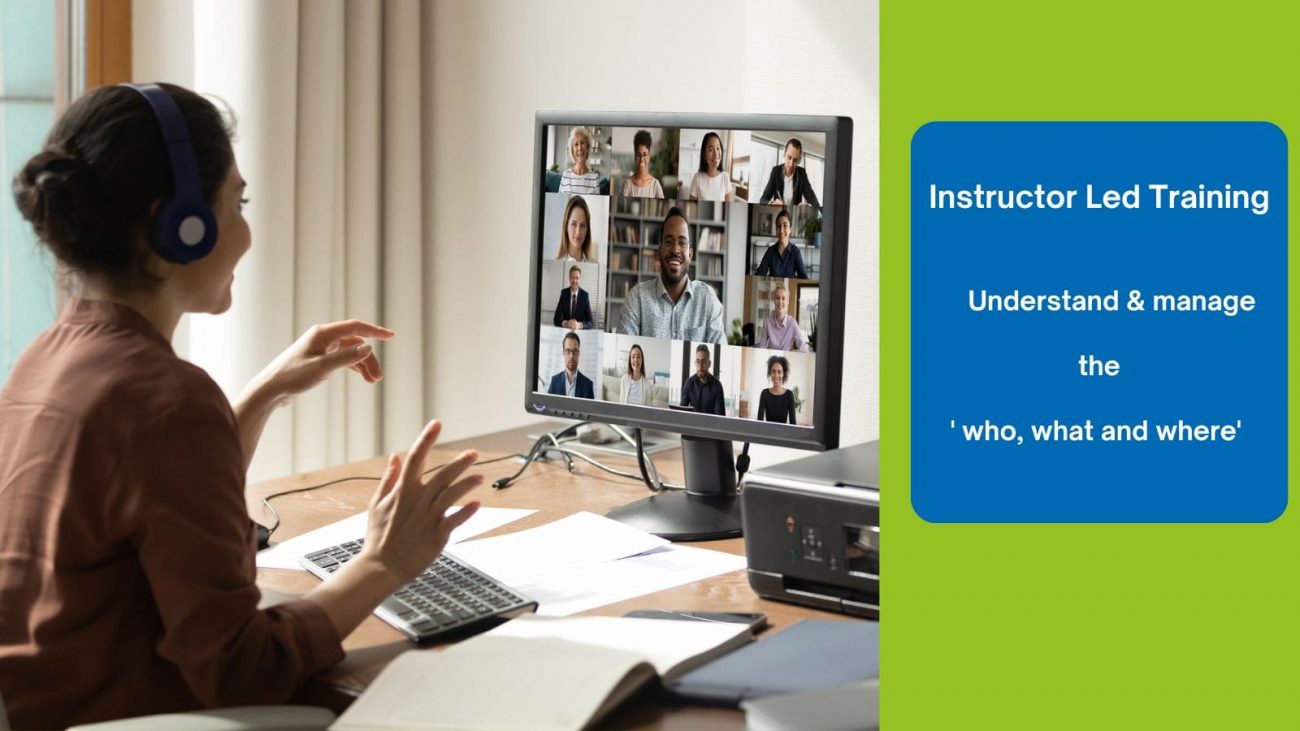Instructor Led Training Transformed

One of the most significant shifts in the past year for many organisations has been transitioning from offline Instructor-Led Training (ILT) to online virtual Instructor-Led Training (vILT). In a Brandon Hall Group, HR and the Impact of COVID-19 survey, they found that 96% of organisations use ILT / vILT to some degree to deliver learning.
After the initial rush of shifting to online learning in response to the pandemic, training teams are turning their attention to making sure virtual sessions are just as engaging as they were when held in person. One of the key learning and development developments in 2021 has involved reviewing newly converted online training and virtual classroom environments to ensure that learning experiences remain effective and engaging for learners.
Organisations are managing more resources than ever before, including new tools, roles and technologies. Training has also become more complex as it moves to virtual. As a result, there's been a need to redesign courses, ensure better remote collaboration, and schedule more sessions. For example, classes that once were held over two days now require shorter sessions over more days (four half-day online sessions instead of two full-day face-to-face training days) to be more easily absorbed in a remote environment.
With all these changes, ILT and the corporate classroom have complexified. There has been a surge in the need for faster delivery, increased productivity, and better operational efficiency, not to mention the requirement to track employee performance and gain feedback on courses. How else do you know who has completed a course and gain insight into the learners' opinion on the course content and delivery?
While ILT can be conducted in person or online, the most crucial aspect is that the learners have real-time access to the instructor for feedback and discussion.
TalentLMS, an e-Learning platform built for success that is easy to use, learn, like, and highly rated, makes it easy to offer excellent training. Whether you're training employees, customers, or partners, you can provide all types of training from one platform. This online lifelong training software lets you develop, deliver, and manage training programs that help great teams grow
The latest TalentLMS 4.10 release provides you with the tools to understand and manage the' who, what and where' with respect to virtual ILT.
When you're limited to final assessment scores, how can you track employee performance?
In TalentLMS, anyone with the relevant permissions can be an Instructor. And instructors need info, such as:
- Who has completed/started/passed/logged into training?
- What do these people think about the course, training, platform?
- Where is that darn file?
More importantly, you want to collect this info without feeling like you're heading into battle each time.
So, let's see what's new, improved, and so much easier in TalentLMS 4.10:
The Who: Instructor-led training gets an intuitive makeover
In this release, you'll notice a few new changes in Instructor-led training units. These changes have improved the experience of creating, tracking, and assessing ILTs.
Specifically, you can now:
- See who has attended an instructor-led training session in the new Attendance column. (Currently, only available for Learners joining via desktop). From here, you can also grade all attendees at once.
- Print Attendance sheets that learners can sign during physical, offline sessions. You can customise the sheets to show preferred columns, including custom user fields.
- Add a description to an ILT unit so that learners can quickly glean any necessary information about their upcoming session(s).
- Enjoy an improved interface where you can more easily manage users and sessions.
Bonus: You now have the option to use ILTs and SCORM units to contribute to a course's final score.
The What: Smarter feedback with Likert scale surveys
In addition to free text and multiple-choice questions, you can now use Likert scale questions in surveys. A Likert scale is a reliable way to measure attitude, opinions, and even reported behaviour.
Likert scales usually offer 3 – 7 opinion points, from high to low, with one neutral option in the middle. They're popular because they can make complex opinions on specific topics easy to analyse and understand. In TalentLMS 4.10, you can use pre-configured responses to create a survey instantly. These responses measure agreement, satisfaction, quality, frequency, and likelihood. Or, you can create your own responses using the custom scale. Use the 99 question ideas for a post-training evaluation survey to get started.
Response types include:
- Level of Agreement
- Level of satisfaction
- Level of quality
- Frequency
- Likelihood
- Custom responses
The Where: Introducing tags for better file management
You can now better organise your files by using tags. Tags are, by default, generated based on the file type, like JPEG, PDF, or MP4. Now, when you click on the "pdf" file tag, all pdf files will come up for you to view.
You can also create custom tags to organise your files better. Custom file tags can be particularly useful in cases where more than one instructor is working on the same course.

